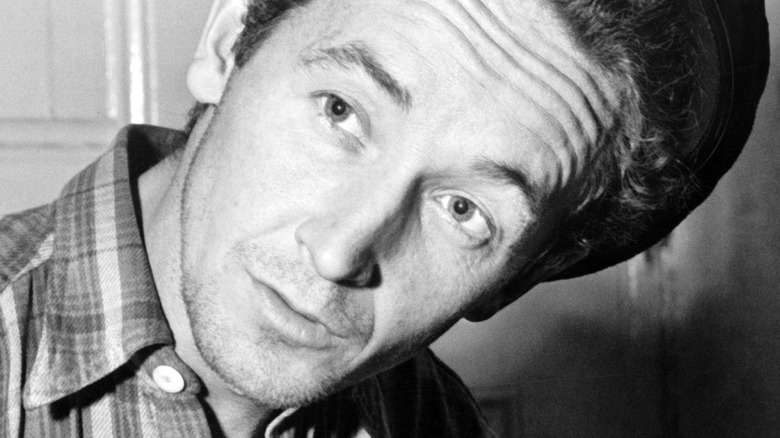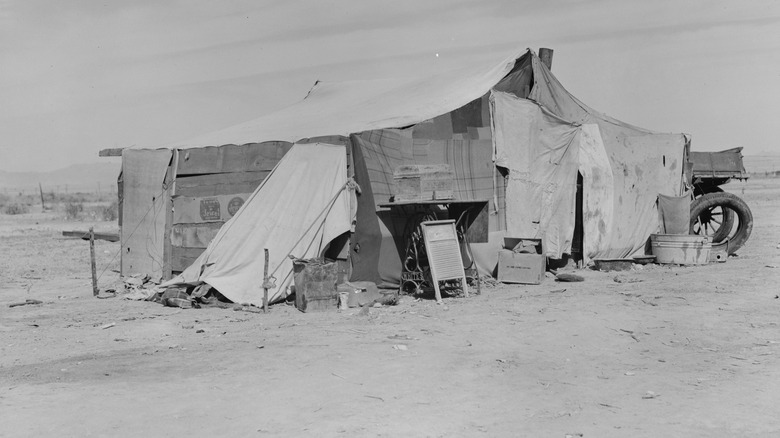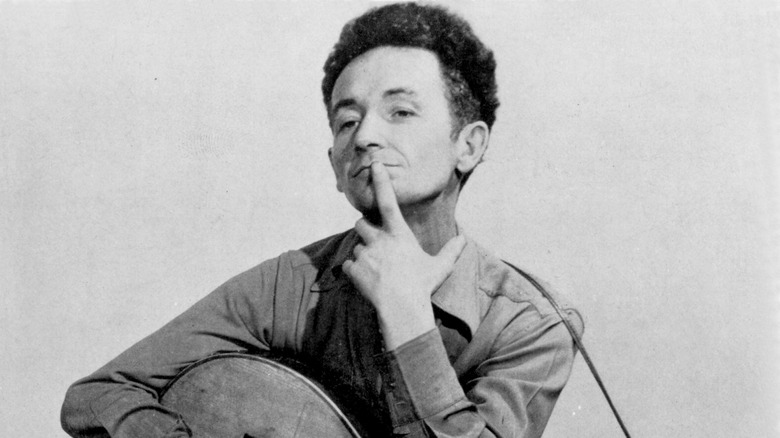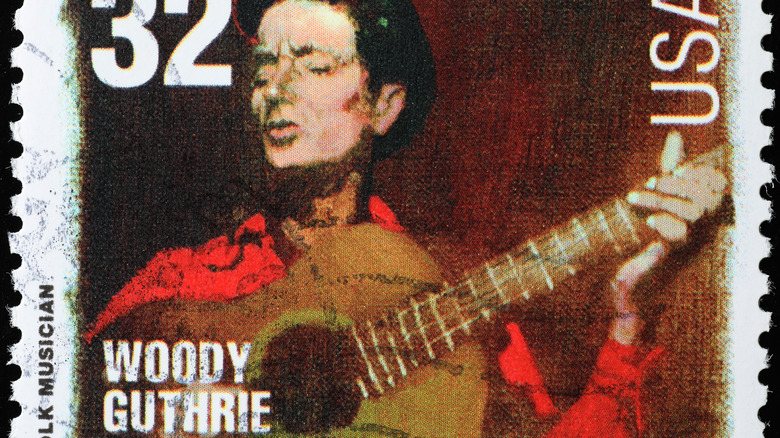The Real Reason Woody Guthrie Wrote This Land Is Your Land
Throughout the history of popular music, more than one song has been thoroughly misunderstood by just about everyone who hears it. For example, there's a common myth of sorts that The Vapors' 1980 hit "Turning Japanese" is about, shall we say, "self-love." It's not — or at least, that's what its songwriter claims. Similarly, Foster the People's "Pumped Up Kicks" is not about cool shoes, but about a school shooting.
For decades, Woody Guthrie's song "This Land Is Your Land" has been misunderstood, to put it mildly. Those familiar with the history of folk music and mid-20th-century populism may know that the song, despite sounding on its surface like a patriotic jingle, is nothing of the sort. As The Kennedy Center notes, it's actually a populist anthem that espouses ideals of socialism. In fact, Guthrie wrote a couple of verses that didn't make it onto early recordings of the song, and if they had, schoolchildren might not be singing it in modern times.
"This Land Is Your Land" was written in response to a patriotic anthem that was popular at the time, a soupy ballad whose lyrics were so extremely patriotic that it prompted Guthrie to pen a song about America with a considerably sharper edge.
Woody Guthrie hits the road, learns about America's shortcomings
Woody Guthrie was born in 1912 in Oklahoma, according to NPR. He grew up well-off, at least for the time and place, but that all changed when his family suffered a series of setbacks, including his dad's business failing, the Great Depression, and his mother being put into a mental institution. He then spent some time as a vagabond, making his way from one end of the country to the other — from California to the New York island, if you will — riding the rails and hitchhiking. He spent some time amongst the Okies and Arkies — impoverished people displaced by the Dust Bowl and forced to seek a better life in California. These travels and what he witnessed helped inform his progressive beliefs.
"I am out to sing songs that will prove to you that this is your world and that if it has hit you pretty hard and knocked you for a dozen loops ... I am out to sing the songs that make you take pride in yourself and in your work. And the songs that I sing are made up for the most part by all sorts of folks just about like you," he would later say of his songs, according to The Kennedy Center.
The anti-God Bless America
By 1940, according to NPR, Woody Guthrie had spent years traveling around the U.S. and developed not only a kinship with those who were poor, displaced, and oppressed, but also an appreciation for the natural beauty of the country. Around that time, a patriotic anthem — Kate Smith's recording of Irving Berlin's "God Bless America" — was enjoying immense popularity, and Guthrie couldn't escape it, no matter where he went. He decided to write a retort, and it laid the groundwork for what would eventually become "This Land Is Your Land."
Originally, the song was entitled "God Blessed America For Me," with that hook serving as the last line of each verse. It was a reference to and retort against the religiosity of "God Bless America," according to The Kennedy Center.
A couple of verses of this song are decidedly critical, verses that would most certainly not be sung by schoolchildren in the same program as "God Bless America." One verse, for example, speaks of Guthrie looking at the unmarked backside of a sign that said "private property," and concluding, "That side was made for you and me." Another juxtaposes long lines of hungry people with nearby churches, and Guthrie questions if this land was really "made for you and me."
Why the saucier verses didn't make the recording
"This Land Is Your Land," when discussed in its original version, is a pointed social commentary from a man who lived the kind of life he sang about. However, the version of the song that was recorded and the version of the song that Woody Guthrie wrote are quite different.
As NPR explains, Guthrie's daughter, Nora, said that at the time, the idea of free speech meant considerably less than it does now. "This is the early '50s, and [U.S. Sen. Joseph] McCarthy's out there, and it was considered dangerous in many ways to record this kind of material," she said.
Nora also added that had her father recorded the song himself, he'd have included the critical lyrics, paying no heed to whether he would be put in jail for it. He was used to being behind bars and to doing without, and it would have meant nothing to him. But when singing group The Weavers put Guthrie's tune to a record, they left out the saucier bits, and that turned out to be the right decision, at least for Guthrie's family. "The Weavers originally just recorded the first three verses — which, in one way, was very, very helpful to my dad, because we had no money. So thank God that they recorded something, and our family was able to get some royalties from that," Nora said.



